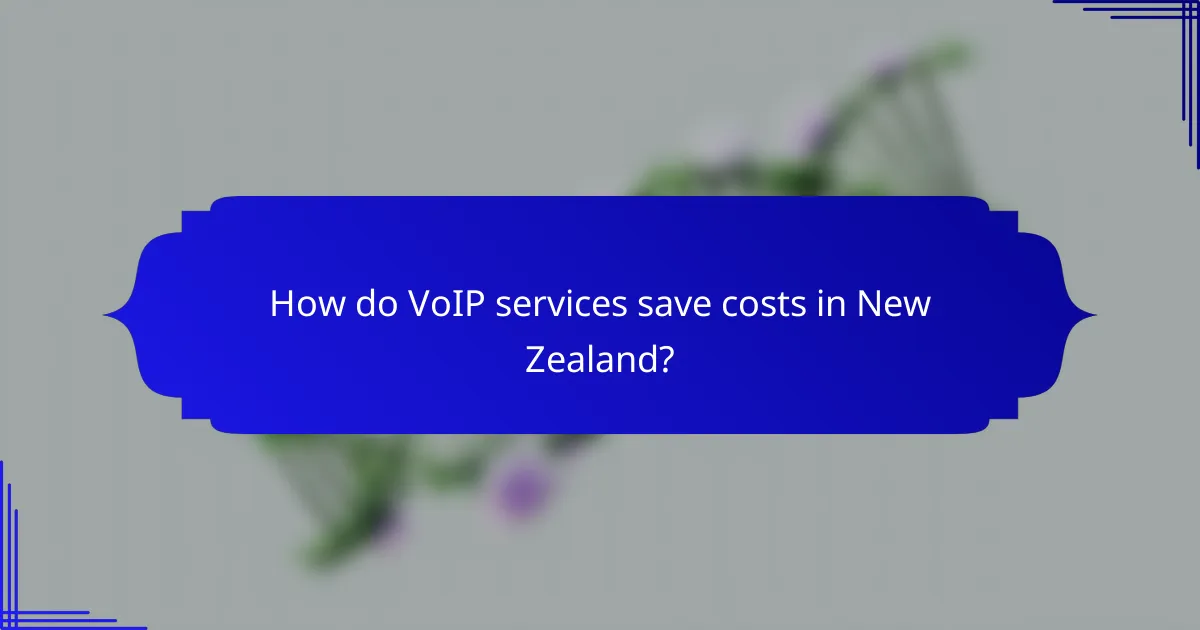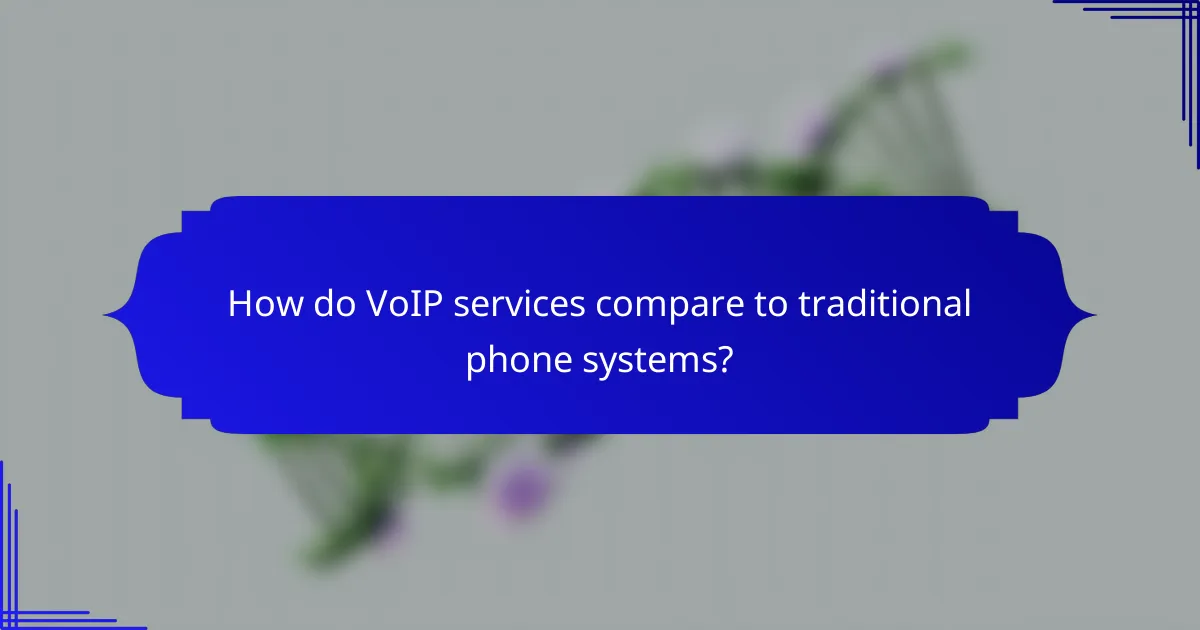VoIP services revolutionize communication by significantly cutting costs for businesses and individuals in New Zealand through the use of internet connectivity instead of traditional phone lines. They not only provide substantial mobility, allowing users to make and receive calls from anywhere with an internet connection, but also offer advanced features like call forwarding and video conferencing that enhance overall communication efficiency.

How do VoIP services save costs in New Zealand?
VoIP services can significantly reduce communication expenses for businesses and individuals in New Zealand by leveraging internet connectivity instead of traditional phone lines. This technology offers various cost-saving benefits, including lower call rates, no need for hardware investment, and reduced maintenance fees.
Reduced call rates
VoIP services typically offer lower call rates compared to traditional landlines and mobile networks. In New Zealand, international calls can be particularly expensive, but VoIP providers often charge a fraction of the cost, making it an attractive option for businesses with overseas clients.
For local calls, many VoIP plans include unlimited calling options or low monthly fees, which can lead to substantial savings over time. Users should compare different VoIP providers to find the best rates that suit their calling habits.
No hardware investment
One of the key advantages of VoIP services is that they often require little to no hardware investment. Unlike traditional phone systems that may need expensive PBX equipment, VoIP can run on existing devices such as computers, smartphones, or tablets.
Many VoIP providers offer software-based solutions that eliminate the need for physical phones, allowing users to make and receive calls through applications. This flexibility can significantly reduce upfront costs and simplify the setup process.
Lower maintenance fees
VoIP services generally incur lower maintenance fees compared to traditional telephony systems. Since VoIP operates over the internet, there is less physical infrastructure to maintain, resulting in lower ongoing costs for users.
Additionally, many VoIP providers offer customer support and system updates as part of their service package, which can further reduce the need for costly maintenance contracts. Businesses in New Zealand can benefit from these savings while ensuring reliable communication.

What mobility advantages do VoIP services offer?
VoIP services provide significant mobility advantages by enabling users to make and receive calls from virtually anywhere with an internet connection. This flexibility enhances productivity and communication for businesses and remote workers alike.
Remote access capabilities
VoIP technology allows users to access their phone systems remotely, meaning calls can be made and received on various devices such as laptops, smartphones, or tablets. This is particularly beneficial for employees who travel frequently or work from different locations, as they can maintain seamless communication without being tied to a physical office.
To maximize remote access, ensure your VoIP provider offers features like call forwarding and voicemail-to-email, which keep you connected even when you are away from your primary device.
Mobile app integration
Many VoIP services come with mobile applications that integrate directly with their systems, allowing users to manage calls, messages, and contacts from their smartphones. This integration means that employees can stay connected and productive while on the go, without needing to switch between different platforms.
When selecting a VoIP service, consider the usability and features of its mobile app, such as video conferencing capabilities and instant messaging, to ensure it meets your team’s needs.
Flexibility for remote teams
VoIP services offer unparalleled flexibility for remote teams by enabling collaboration across different time zones and locations. Team members can communicate effectively through voice, video, and messaging, fostering a cohesive work environment regardless of physical distance.
To support remote teams, choose a VoIP solution that provides features like group calling and screen sharing, which can enhance teamwork and project management. Additionally, consider the scalability of the service to accommodate future growth or changes in team structure.

What advanced features do VoIP services provide?
VoIP services offer a range of advanced features that enhance communication efficiency and flexibility. These features include call forwarding, video conferencing, and voicemail to email, which cater to the diverse needs of businesses and individuals alike.
Call forwarding
Call forwarding allows users to redirect incoming calls to another phone number, ensuring that important calls are not missed. This feature can be set up to forward calls to mobile phones, landlines, or even voicemail, depending on user preferences.
When considering call forwarding, it’s essential to check if your VoIP provider charges extra for this feature, as some may include it at no additional cost while others might not. Additionally, users should be aware of the potential for increased call costs when forwarding to international numbers.
Video conferencing
Video conferencing is a key feature of many VoIP services, enabling real-time visual communication between multiple participants. This feature is particularly useful for remote teams, allowing for face-to-face meetings without the need for travel.
When using video conferencing, consider the bandwidth requirements, as high-quality video calls may need a stable internet connection with sufficient speed. Many VoIP providers offer integrated solutions that include screen sharing and chat functionalities, enhancing collaboration during meetings.
Voicemail to email
Voicemail to email converts voice messages into audio files and sends them directly to the user’s email inbox. This feature allows for easy access to voicemails from any device and can improve response times.
To make the most of voicemail to email, ensure that your email account has sufficient storage and that you regularly check for new messages. Some VoIP services also offer transcription options, turning voice messages into text, which can further streamline communication.

What should businesses consider when choosing VoIP services?
When selecting VoIP services, businesses should prioritize factors such as scalability, the reputation of service providers, and the range of features offered. These elements can significantly impact the effectiveness and cost-efficiency of communication solutions.
Scalability options
Scalability is crucial for businesses anticipating growth or seasonal fluctuations. A VoIP service should easily accommodate adding or removing lines without significant costs or disruptions. Look for providers that offer flexible plans, allowing you to scale your service according to your current needs.
Consider whether the service can support multiple locations or remote workers. Many VoIP solutions provide cloud-based options that enable seamless expansion across different sites, which is essential for businesses with a distributed workforce.
Service provider reputation
The reputation of a VoIP service provider can greatly influence your experience. Research customer reviews and industry ratings to gauge reliability and customer support quality. A provider with a strong track record is more likely to deliver consistent service and timely assistance when issues arise.
Additionally, check for compliance with relevant regulations, such as those set by the Federal Communications Commission (FCC) in the U.S. or similar bodies in other countries. A reputable provider will adhere to these standards, ensuring your service is secure and reliable.
Feature set comparison
Different VoIP services offer varying features that can enhance communication efficiency. Common features to compare include call forwarding, voicemail-to-email, video conferencing, and integration with customer relationship management (CRM) systems. Identify which features are essential for your business operations.
It can be helpful to create a comparison chart to evaluate how different providers stack up against each other. This can include pricing, features, and customer support options, allowing for a straightforward assessment of which service aligns best with your business needs.

How do VoIP services compare to traditional phone systems?
VoIP services generally offer significant advantages over traditional phone systems, particularly in terms of cost savings, mobility, and advanced features. While traditional systems rely on physical lines, VoIP utilizes internet connectivity, enabling more flexible and feature-rich communication options.
Cost efficiency
VoIP services typically reduce communication costs by leveraging the internet, which can lead to savings of 30-50% compared to traditional phone systems. Monthly fees for VoIP plans are often lower, and many providers offer unlimited calling options, which can be particularly beneficial for businesses with high call volumes.
Additionally, VoIP eliminates the need for expensive hardware installations and maintenance. Users can often use existing devices such as smartphones and computers, further reducing setup costs. It’s essential to consider potential hidden fees, such as those for international calls or additional features, when evaluating overall cost efficiency.
Feature richness
VoIP services come equipped with a wide array of advanced features that are often not available with traditional phone systems. Common features include call forwarding, voicemail-to-email, video conferencing, and integration with customer relationship management (CRM) software. These capabilities enhance productivity and streamline communication.
Moreover, many VoIP providers offer customizable plans that allow users to select features that best suit their needs. This flexibility can be particularly advantageous for businesses looking to scale operations. When choosing a VoIP service, consider which features are essential for your specific use case to maximize value.
